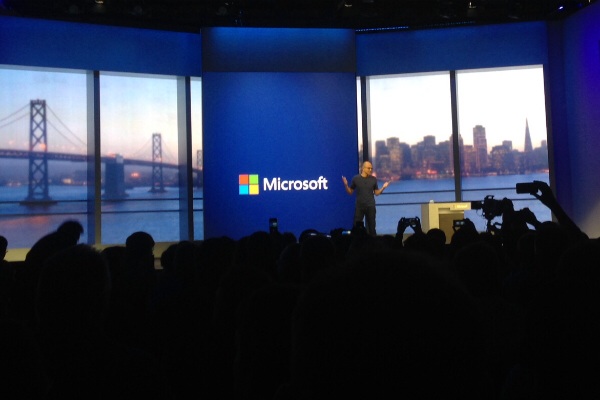

This post is in partnership with Fortune, which offers the latest business and finance news. Read the article below originally published at Fortune.com.
How does a CEO grab attention when he’s the follow-up act to a brash, voluble leader like Steve Ballmer? For Satya Nadella, who hardly seems prone to the same kind of sweat-soaked stage performance of his predecessor, the answer lay in a bold strategic gesture: Get Microsoft Office onto the iPad.
Office, of course, had long been Microsoft’s great cash cow fenced off from the green pastures of the tablet market. Some believed it was the reason Microsoft started making Surface tablets after decades of not manufacturing personal computing devices. That expensive experiment hasn’t exactly delivered a hit. Surface sales are growing, but its 2% market share lags those of Samsung, Amazon’s Kindle Fire, and of course the iPad.
With Nadella taking the reins from Ballmer, Microsoft has the chance to begin a new era — distinct from the Ballmer years that saw modest growth and a move into enterprise software, and even more remote from the Gates years when Microsoft ruled PC software with an iron fist. Nadella’s Microsoft appears to be a company that aims to compete in markets rather than control them.
MORE: Nadella: Microsoft needs a ‘data culture’
Nadella’s experience is aligned with the same technologies that promise future growth — cloud computing, multi-platforms, mobility, big data — the antithesis of the proprietary software that Microsoft built its historical success on. That’s why the Office 365 for iPad announcement was notable. It wasn’t so much two longtime enemies sharing revenue. It was Microsoft risking its own mobile platform by expanding to another, bigger platform. It was a Microsoft open like never before.
The announcement was also Nadella’s first big public appearance, a product launch cum CEO debut. The move was a risky one: It could telegraph that Microsoft was capitulating to Apple, running its prized wares on its old rival’s device while paying a 30% share of revenue for the privilege. Increasingly, Nadella is instead being seen as a leader who can finally usher the company out of the PC era and into the cloud economy.
Last month, when Microsoft announced that Office apps would be available for the iPad, the news stirred a ripple of notice. Analysis was mixed. The New York Times wondered if it wasn’t the right move too late. Techcrunch found it to be worth the wait. Someone at Forbesdismissed it as a non-game changer.
After a few weeks in the App Store, Office for iPad is proving the early skeptics wrong. More than 12 million people downloaded Office Apps in the first week. Today, Word, Excel, and Powerpoint are the three most popular free apps in the iPad App Store (excluding games, which shows that tablets may be better for idleness than productivity). The basic apps are free for bare-bones functionality, but a subscription to Office 365 opens up more features.
For investors, the arrival of Office for iPad is unlikely to translate into material earnings, at least any time soon. It may open Microsoft to businesses that prefer tablets over traditional PCs, but it could also cannibalize the company’s older, high-margin markets. Desktop and laptop sales have been declining since the iPad’s introduction, although recent months have shown signs those declines are stabilizing.
MORE: For Microsoft’s Nadella, signs of leadership potential
If the move has little short-term benefit for Microsoft, its symbolic value is higher. CEOs of prominent companies like Microsoft often set the tone of a company, and in some ways Microsoft now appears to have lost the cloud hanging over it when Ballmer was there. Ballmer, of course, also worked to push Microsoft into a more open direction, but somehow Nadella’s presence makes it seem like it may finally be happening.
Office, of course, is only one part of Microsoft’s business. It’s the prime contributor to the company’s business division, along with Sharepoint and Exchange. That division makes up a third of Microsoft’s revenue and three-fifths of its operating income. But growth in the division has been flat — revenue rose only 2.5% in Microsoft’s last fiscal year (ended June 2013) and declined 6% in the last six months of 2013.
Microsoft is seeing faster revenue growth in its server and online services divisions, although these segments have much lower margins. (The online division has been a perennial money loser.) So while the Office move is seen as a symbolic victory for Nadella’s Microsoft, the company is still weighed down by many of the same old issues: an enterprise software market and the aging business in PC operating software.
Office for iPad is a strong start to Nadella’s follow-up act to Ballmer. But it will need to be followed by a lot more creative, bold moves to change Microsoft into the dynamic, future-oriented company that investors are hoping it can become.
More Must-Reads from TIME
- Donald Trump Is TIME's 2024 Person of the Year
- Why We Chose Trump as Person of the Year
- Is Intermittent Fasting Good or Bad for You?
- The 100 Must-Read Books of 2024
- The 20 Best Christmas TV Episodes
- Column: If Optimism Feels Ridiculous Now, Try Hope
- The Future of Climate Action Is Trade Policy
- Merle Bombardieri Is Helping People Make the Baby Decision
Contact us at letters@time.com